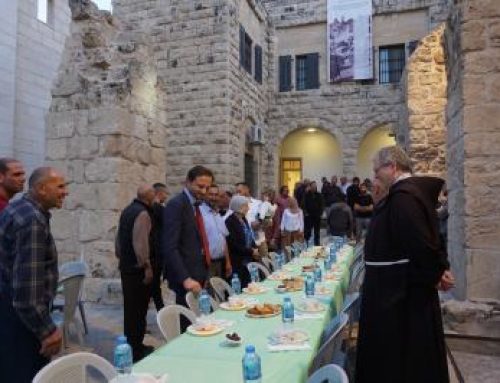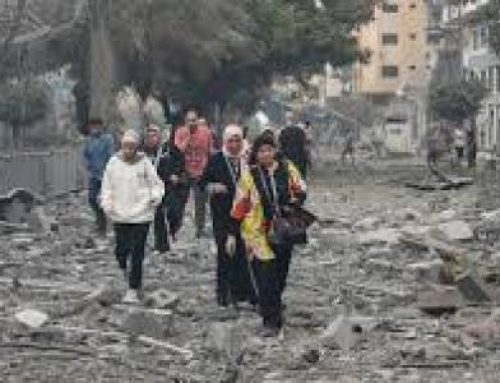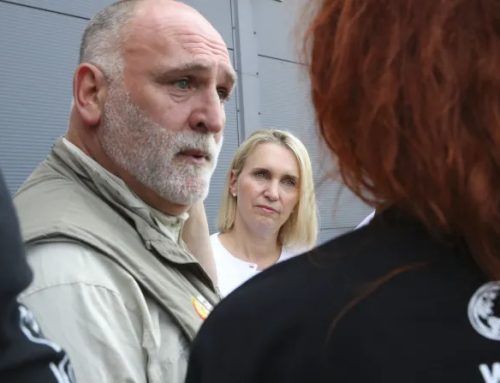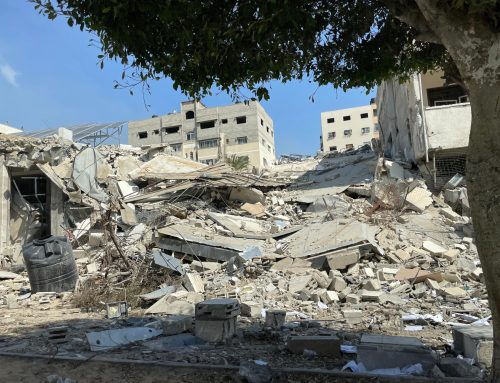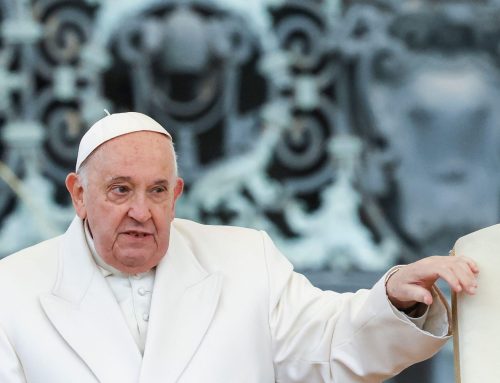Sandro Magister
chiesa
He again proposed the decalogue of Moses as the “ole star” for Israel, Christians, and all of humanity. But Benedict XVI’s words to the Jews fall on very rough terrain. Anna Foa and Mordechay Lewy: Judaism must also engage in self-criticism
Benedict XVI’s words yesterday in the synagogue of Rome – presented further below in their entirety – are all the more revealing in that they reverberated in a landscape that is not entirely friendly, as is inevitable between two faiths so united in their origin and at the same time so radically divided by that Jesus of Nazareth who for Christians is the Son of God.
Pope Joseph Ratzinger was welcomed to the synagogue by the chief rabbi of Rome, Riccardo Di Segni, and by practically the entire Jewish community of Rome, the largest in Italy and the heir of the one that inhabited the city “caput mundi” even before the arrival of the apostles Peter and Paul, Jews who had converted to Jesus.
But the other famous rabbi of Italy, Giuseppe Laras of the Jewish community of Milan, wasn’t there. He didn’t believe in this encounter, and said, “only the Church will benefit from it.” In his view, with Benedict XVI the fraternal relationship between Jews and Catholics has not been strengthened, but “has become weaker and weaker.”
Rabbi Di Segni replied, “Time will tell which of
In effect, there are many “undecided” questions between the Jews and the Church of Rome.
THE DAY OF THE “MOED DI PIOMBO”
Even the date chosen for the visit had two different connotations. For the Jews of Rome, January 17 is the day of the “Moed di piombo”: the commemoration of the fire that was ignited in their ghetto out of hatred in 1793, fortunately extinguished by a violent rainstorm that fell out of a “lead” (“piombo”) colored sky.
The fenced-in ghetto was for centuries the way of life for Jews in papal Rome. At the end of his visit to the synagogue, Benedict XVI inaugurated in the Jewish Museum an exhibition on how, in the eighteenth century, Roman Jews were required to participate in the installation ceremony for each new pope: with flowers, banners, and standards, in the area between the Colosseum and the Arch of Titus, which celebrates the definitive destruction of the Temple of Jerusalem by the Roman empire.
THE REFUSAL OF RABBI LARAS
By January 17 is also, in Italy, the “Day for the exploration and development of dialogue between Catholics and Jews.” Since 2001, the Jewish community has been promoting it together with the Italian bishops, and since 2005, both sides have agreed to dedicate it, year after year, to one of the ten commandments, in the wake of the speech given that year by Benedict XVI in the synagogue of Cologne.
Last year, however, the Jews retracted their participation in the day, above all at the urging of Rabbi Laras, blaming Benedict XVI himself, and in particular his decision to introduce into the ancient Roman rite for Good Friday the prayer that God “may enlighten” the hearts of the Jews, “that they may recognize Jesus Christ as Savior of all men.” A prayer judged by Laras to be unacceptable, because it is aimed at the conversion of Jews to the Christian faith.
Not all Italian Jews agreed with this act of rupture. But the controversy surrounding Benedict XVI took on even harsher tones and spread to the entire world because of the revocation of excommunication for four Lefebvrist bishops with anti-Jewish tendencies, one of whom, Richard Williamson of England, had blatantly denied the Holocaust.
The pope explained the intention for his action in a letter to the Catholic bishops dated March 10, 2009. And in one passage of the letter, he thanked “the Jewish friends” who – more than many churchmen – had helped him “to remove misunderstanding and reestablish friendship and trust.”
The storm died down a little. And so in 2010, this January 17, the Italian Jews again joined the bishops in promoting the day of dialogue, dedicating it to the commandment “Remember the Sabbath day, to keep it holy,” the fourth in the Jewish numbering.
The climate had been improved in part by Benedict XVI’s trip to the Holy Land, last May.
But even after that trip, the controversial questions remained open. Two of them in particular, both interrelated: Pius XII, and the Holocaust.
THE SILENCES OF PIUS XII AND OF THE JEWS
The main accusation that many Jews all over the world – but also some Catholics – make against Pius XII is that he was silent in the face of the Nazi extermination.
Before entering the synagogue yesterday, Benedict XVI stopped in front of the stone that commemorates the deportation to Auschwitz of a thousand Jews from Rome, on October 16, 1943. The accusation against Pius XII is that he was also silent on that occasion, as the president of the Jewish community of Rome, Riccardo Pacifici, reiterated in the speech with which he welcomed the pope to the synagogue:
“The silence of Pius XII in the face of the Shoah still gives us pain, as an unfulfilled act. He might not have stopped the death trains, but he would have transmitted a signal, a word of final comfort and human solidarity, to our brothers and sisters who were being taken to the ovens of Auschwitz.”
In defense of Pius XII, it is maintained that he was silent in order to avoid provoking, with public protests, even more victims. And on the contrary, he did a great deal to save the lives of many Jews, who in a effect found protection in Catholic churches, convents, schools. Protection acknowledged with emotional words from Pacifici, whose father found safety in a convent of sisters in Florence.
Precisely in the days leading up to Benedict XVI’s visit to the synagogue, other cases of Jews who were saved became known. Some of these found refuge during the war in the Roman abbey of Tre Fontane, built on the site of St. Paul’s martyrdom. The Germans had established themselves there, but they didn’t realize that among the monks, hidden by the monastic habit, there were also Jews, who were saved in the end.
On the historiographical level, the profile of Pius XII as “Hitler’s pope” appears increasingly unfounded. But criticism of his public silence about the Holocaust remains strong and widespread. And this explains the negative reaction of many Jews to the progress of the beatification cause of Pius XII, one important step in which was the proclamation of his “heroic virtues,” last December 19.
According to Rabbi Laras, this decision by Benedict XVI should have been sufficient reason for the Jews of Rome to cancel his visit to the synagogue.
But the question of silence about the Holocaust is more complex than it may appear. In addition to the silence of Pius XII, there were also the silences of others, which lasted long after the second war. The accusations against Pius XII became loud and persistent only after his death, beginning in the 1960’s. Because before then, the Jewish world was also silent, not so much about that pope as about the Holocaust itself:
“The fifteen years after the second world war that in Europe was the period of silence and of the great removal of the Holocaust, was in fact also for Israel a period of silence.”
So wrote Anna Foa, a Jewish professor of history at the University of Rome “La Sapienza,” in an article published in “L’Osservatore Romano” on January 15, 2010, two days before Benedict XVI’s visit to the synagogue.
An article of considerable significance, because of where it was written and when.
ANNA FOA AND THE “ORIGINAL SIN” OF ISRAEL
In the article, Anna Foa endorses the ideas of one of the leading scholars of Zionism, Georges Bensoussan. In the opinion of both, the state of Israel was not born as”redemption” from the extermination of the Jews carried out by Hitler. The real force behind the state was Zionism, already during the British mandate, with the settlement of that land by Jews who wanted to create a new man. The idea of the Holocaust as the foundation of the state of Israel gained strength only much later, after the Eichmann trial and especially after the war of Yom Kippur, in recent decades. And what paved the way for it – Anna Foa writes – was precisely the fifteen years of postwar silence: a silence “inhabited by repressed memories, by new fears identified with the ancient fears that had come true in the Holocaust, by the sense of guilt and the desire for revenge.”
Interpreted this way, the birth of the state of Israel is no longer that “original sin” which even today many of its friends and enemies ascribe to it. The latter of these include many Catholics, first among them the Arabs living in the region. The most authoritative of these, the Latin patriarch of Jerusalem Fouad Twal, was also in the synagogue of Rome yesterday, at the pope’s arrival.
According to this “vulgate,” the state of Israel was created by the great powers in order to remedy the previous extermination in Europe of six million Jews, which meant that one injustice was compensated by committing another against the local Arab population. In 1964, when Paul VI went to the Holy Land, the Church of Rome had not yet accepted the existence of the new state. And when three decades later, in 1993, the Holy See finally recognized the state of Israel and established diplomatic relations with it, the Arab Christians took this act as a betrayal.
But on the part of John Paul II, and now of Benedict XVI, the recognition of Israel no longer has any reservation.
While, on the other hand, the incessant use of the memory of the Holocaust as a weapon of accusation against the Church of Pius XII and of his successors prevents Judaism from leaving behind its identity as a victim.
This is how Anna Foa concludes her article in “L’Osservatore Romano.” By taking the Holocaust, instead of Zionism, as the foundation of its political and religious identity, Israel risks “clinging to catastrophe instead of hope in the future”; it closes itself off in “a sorrowful identity that always oscillates between Auschwitz and Jerusalem.”
MORDECHAY LEWY AND THE INABILITY TO FORGIVE
Also in “L’Osservatore Romano,” in the days before Benedict XVI’s visit to the synagogue, another authoritative Jew went even deeper into the heart of the same question.
The author, Mordechay Lewy, is the Israeli ambassador to the Holy See, and in addition to publishing his article in the Vatican newspaper on January 13, also published it in the monthly magazine for Jewish Italians “Pagine ebraiche.”
Lewy acknowledges that “only a few representatives of Judaism are really involved in the current dialogue with Catholics.” They are above all Reformed Jews, while the Orthodox currents are more resistant.
The reason – he writes – is that the dialogue between Jews and Christians is asymmetrical. While the Christians have the Old Testament together with the New, the Jews tend to define their own religious identity in terms of “theological self-sufficiency.” They feel that they are the only ones “chosen” by God. Strenuously trying to survive in the midst of Christians who for centuries did everything they could to convert them, “kindly or, in the majority of cases, coercively.”
In this way, “a deep and painful wound inflicted in the past is opened every time the victim finds himself in front of the symbols of the executioner.”
This is still what happens today for many Jews, Lewy writes:
“They want to avoid any situation in which they have to forgive someone, especially if he is identified rightly or wrongly as a representative of the executioner. The Jewish victim seems incapable of granting absolution for wrongs committed long ago or recently against his brothers and sisters.”
Self-criticism is no small thing. But in the speech he addressed to Benedict XVI, in welcoming him to the synagogue, the chief rabbi of Rome, Riccardo Di Segni, had words of hope about Jews and Christians being “brothers”:
“The narrative of Sefer Bereshit, Genesis, gives us some precious suggestions for understanding. As Rabbi Sachs explains, from the beginning to the end of the book, there is leitmotif tying together the different stories. The relationship between brothers starts out badly, with Cain killing Abel. Another pair of brothers, Isaac and Ishmael, live separated, the victims of an inherited rivalry, but are united in their gesture of compassion when they bury their father Abraham. A third pair of brothers, Esau and Jacob, have an equally conflicting relationship, they meet for a brief reconciliation and an embrace and then their roads separate. Finally, there is the story of Joseph and his brothers, which begins dramatically with an attempted murder and sale into slavery but is resolved with a final reconciliation when Joseph’s brothers admit their error and give proof of their willingness to sacrifice themselves one for the other. If ours is a relationship of brothers, we should ask ourselves quite sincerely what point of this journey we have reached, and how far we still have to travel before we recover an authentic relationship of brotherhood and understanding, and what we have to do to achieve this.”
*
Against this backdrop, this is what pope Joseph Ratzinger said in the synagogue of Rome on January 17, 2010.
__________
THE “TEN WORDS” THAT ILLUMINATE THE WORLD
by Benedict XVI
“What marvels the Lord worked for them!
What marvels the Lord worked for us:
Indeed we were glad” (Ps 126).
“How good and how pleasant it is
when brothers live in unity” (Ps 133).
Dear friends, brothers and sisters,
1. At the beginning of this encounter in the Great Synagogue of the Jews of Rome, the Psalms which we have heard suggest to us the right spiritual attitude in which to experience this particular and happy moment of grace: the praise of the Lord, who has worked marvels for us and has gathered us in his “hesed,” his merciful love, and thanksgiving to him for granting us this opportunity to come together to strengthen the bonds which unite us and to continue to travel together along the path of reconciliation and fraternity. […]
When he came among you for the first time, as a Christian and as Pope, my Venerable Predecessor John Paul II, almost 24 years ago, wanted to make a decisive contribution to strengthening the good relations between our two communities, so as to overcome every misconception and prejudice. My visit forms a part of the journey already begun, to confirm and deepen it. With sentiments of heartfelt appreciation, I come among you to express to you the esteem and the affection which the Bishop and the Church of Rome, as well as the entire Catholic Church, have towards this Community and all Jewish communities around the world.
2. The teaching of the Second Vatican Council has represented for Catholics a clear landmark to which constant reference is made in our attitude and our relations with the Jewish people, marking a new and significant stage. The Council gave a strong impetus to our irrevocable commitment to pursue the path of dialogue, fraternity and friendship, a journey which has been deepened and developed in the last forty years, through important steps and significant gestures. Among them, I should mention once again the historic visit by my Venerable Predecessor to this Synagogue on 13 April 1986, the numerous meetings he had with Jewish representatives, both here in Rome and during his Apostolic Visits throughout the world, the Jubilee Pilgrimage which he made to the Holy Land in the year 2000, the various documents of the Holy See which, following the Second Vatican Council’s Declaration “Nostra aetate”, have made helpful contributions to the increasingly close relations between Catholics and Jews. I too, in the course of my Pontificate, have wanted to demonstrate my closeness to and my affection for the people of the Covenant. I cherish in my heart each moment of the pilgrimage that I had the joy of making to the Holy Land in May of last year, along with the memories of numerous meetings with Jewish Communities and Organizations, in particular my visits to the Synagogues of Cologne and New York.
Furthermore, the Church has not failed to deplore the failings of her sons and daughters, begging forgiveness for all that could in any way have contributed to the scourge of anti- Semitism and anti-Judaism (cf. Commission for Religious Relations with the Jews, “We Remember: A Reflection on the Shoah,” 16 March 1998). May these wounds be healed forever! The heartfelt prayer which Pope John Paul II offered at the Western Wall on 26 March 2000 comes back to my mind, and it calls forth a profound echo in our hearts: “God of our Fathers, you chose Abraham and his descendants to bring your Name to the nations: we are deeply saddened by the behaviour of those who in the course of history have caused these children of yours to suffer, and asking your forgiveness we wish to commit ourselves to genuine brotherhood with the people of the Covenant.”
3. The passage of time allows us to recognize in the Twentieth Century a truly tragic period for humanity: ferocious wars that sowed destruction, death and suffering like never before; frightening ideologies, rooted in the idolatry of man, of race, and of the State, which led to brother killing brother. The singular and deeply disturbing drama of the Shoah represents, as it were, the most extreme point on the path of hatred that begins when man forgets his Creator and places himself at the centre of the universe. As I noted during my visit of 28 May 2006 to the Auschwitz Concentration camp, which is still profoundly impressed upon my memory, “the rulers of the Third Reich wanted to crush the entire Jewish people”, and, essentially, “by wiping out this people, they intended to kill the God who called Abraham, who spoke on Sinai and laid down principles to serve as a guide for mankind, principles that remain eternally valid.”
Here in this place, how could we not remember the Roman Jews who were snatched from their homes, before these very walls, and who with tremendous brutality were killed at Auschwitz? How could one ever forget their faces, their names, their tears, the desperation faced by these men, women and children? The extermination of the people of the Covenant of Moses, at first announced, then systematically programmed and put into practice in Europe under the Nazi regime, on that day tragically reached as far as Rome. Unfortunately, many remained indifferent, but many, including Italian Catholics, sustained by their faith and by Christian teaching, reacted with courage, often at risk of their lives, opening their arms to assist the Jewish fugitives who were being hunted down, and earning perennial gratitude. The Apostolic See itself provided assistance, often in a hidden and discreet way.
The memory of these events compels us to strengthen the bonds that unite us so that our mutual understanding, respect and acceptance may always increase.
4. Our closeness and spiritual fraternity find in the Holy Bible – in Hebrew “Sifre Qodesh” or “Book of Holiness” – their most stable and lasting foundation, which constantly reminds us of our common roots, our history and the rich spiritual patrimony that we share. It is in pondering her own mystery that the Church, the People of God of the New Covenant, discovers her own profound bond with the Jews, who were chosen by the Lord before all others to receive his word (cf. Catechism of the Catholic Church, 839). “The Jewish faith, unlike other non-Christian religions, is already a response to God’s revelation in the Old Covenant. To the Jews ‘belong the sonship, the glory, the covenants, the giving of the law, the worship, and the promises; to them belong the patriarchs and of their race, according to the flesh is the Christ’ (Rom 9:4-5), ‘for the gifts and the call of God are irrevocable!’ (Rom 11:29)” (Ibid).
5. Many lessons may be learnt from our common heritage derived from the Law and the Prophets. I would like to recall some of them: first of all, the solidarity which binds the Church to the Jewish people “at the level of their spiritual identity”, which offers Christians the opportunity to promote “a renewed respect for the Jewish interpretation of the Old Testament” (cf. Pontifical Biblical Commission, “The Jewish people and their Sacred Scriptures in the Christian Bible,” 2001, pp.12 and 55); the centrality of the Decalogue as a common ethical message of permanent value for Israel, for the Church, for non-believers and for all of humanity; the task of preparing or ushering in the Kingdom of the Most High in the “care for creation” entrusted by God to man for him to cultivate and to care for responsibly (cf. Gen 2:15).
6. In particular, the Decalogue – the “Ten Words” or Ten Commandments (cf. Ex 20:1-17; Dt 5:1-21) – which comes from the Torah of Moses, is a shining light for ethical principles, hope and dialogue, a guiding star of faith and morals for the people of God, and it also enlightens and guides the path of Christians. It constitutes a beacon and a norm of life in justice and love, a “great ethical code” for all humanity. The “Ten Commandments” shed light on good and evil, on truth and falsehood, on justice and injustice, and they match the criteria of every human person’s right conscience. Jesus himself recalled this frequently, underlining the need for active commitment in living the way of the Commandments: “If you wish to enter into life, observe the Commandments” (Mt 19:17). From this perspective, there are several possible areas of cooperation and witness. I would like to recall three that are especially important for our time.
The “Ten Commandments” require that we recognize the one Lord, against the temptation to construct other idols, to make golden calves. In our world there are many who do not know God or who consider him superfluous, without relevance for their lives; hence, other new gods have been fabricated to whom man bows down. Reawakening in our society openness to the transcendent dimension, witnessing to the one God, is a precious service which Jews and Christians can offer together.
The “Ten Commandments” call us to respect life and to protect it against every injustice and abuse, recognizing the worth of each human person, created in the image and likeness of God. How often, in every part of the world, near and far, the dignity, the freedom and the rights of human beings are trampled upon! Bearing witness together to the supreme value of life against all selfishness, is an important contribution to a new world where justice and peace reign, a world marked by that “shalom” which the lawgivers, the prophets and the sages of Israel longed to see.
The “Ten Commandments” call us to preserve and to promote the sanctity of the family, in which the personal and reciprocal, faithful and definitive “Yes” of man and woman makes room for the future, for the authentic humanity of each, and makes them open, at the same time, to the gift of new life. To witness that the family continues to be the essential cell of society and the basic environment in which human virtues are learned and practised is a precious service offered in the construction of a world with a more human face.
7. As Moses taught in the “Shema” (cf. Dt 6:5; Lev 19:34) – and as Jesus reaffirms in the Gospel (cf. Mk 12:19-31), all of the Commandments are summed up in the love of God and lovingkindness towards one’s neighbour. This Rule urges Jews and Christians to exercise, in our time, a special generosity towards the poor, towards women and children, strangers, the sick, the weak and the needy. In the Jewish tradition there is a wonderful saying of the Fathers of Israel: “Simon the Just often said: The world is founded on three things: the Torah, worship, and acts of mercy” (Avoth 1:2). In exercising justice and mercy, Jews and Christians are called to announce and to bear witness to the coming Kingdom of the Most High, for which we pray and work in hope each day.
8. On this path we can walk together, aware of the differences that exist between us, but also aware of the fact that when we succeed in uniting our hearts and our hands in response to the Lord’s call, his light comes closer and shines on all the peoples of the world. The progress made in the last forty years by the International Committee for Catholic-Jewish Relations and, in more recent years, by the Mixed Commission of the Chief Rabbinate of Israel and of the Holy See, are a sign of our common will to continue an open and sincere dialogue. Tomorrow here in Rome, in fact, the Mixed Commission will hold its ninth meeting, on “Catholic and Jewish Teaching on Creation and the Environment”; we wish them a profitable dialogue on such a timely and important theme.
9. Christians and Jews share to a great extent a common spiritual patrimony, they pray to the same Lord, they have the same roots, and yet they often remain unknown to each other. It is our duty, in response to God’s call, to strive to keep open the space for dialogue, for reciprocal respect, for growth in friendship, for a common witness in the face of the challenges of our time, which invite us to cooperate for the good of humanity in this world created by God, the Omnipotent and Merciful.
10. Finally, I offer a particular reflection on this, our city of Rome, where, for nearly two millennia, as Pope John Paul II said, the Catholic Community with its Bishop and the Jewish Community with its Chief Rabbi have lived side by side. May this proximity be animated by a growing fraternal love, expressed also in closer cooperation, so that we may offer a valid contribution to solving the problems and difficulties that we still face.
I beg from the Lord the precious gift of peace in the world, above all in the Holy Land. During my pilgrimage there last May, at the Western Wall in Jerusalem, I prayed to Him who can do all things, asking: “Send your peace upon this Holy Land, upon the Middle East, upon the entire human family; stir the hearts of those who call upon your name, to walk humbly in the path of justice and compassion”.
I give thanks and praise to God once again for this encounter, asking him to strengthen our fraternal bonds and to deepen our mutual understanding.
“O praise the Lord, all you nations,
acclaim him, all you peoples.
Strong is his love for us,
He is faithful forever.
Alleluia” (Ps 117)
(Unofficial Vatican translation)


